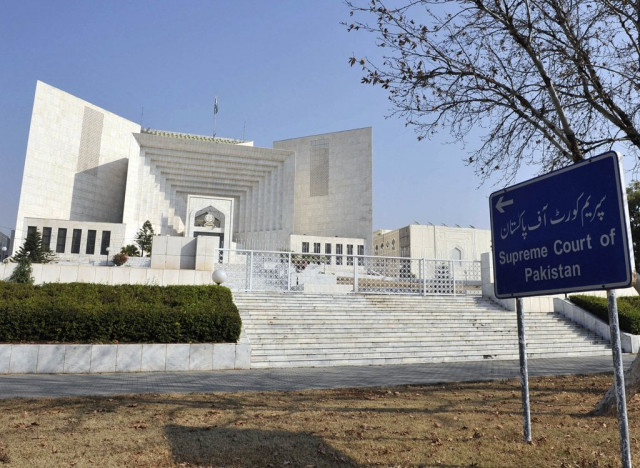SC makes SBP approval compulsory for NAB action
Says NAB Ordinance to safeguard stable functioning of fiscal governance in country

The Supreme Court has ruled that the purpose behind enacting sections 31-C and 31-D of the NAB Ordinance is to safeguard sound and stable functioning of the economic, banking and fiscal governance in the country by honouring the financial decisions of the State Bank of Pakistan (SBP).
"The import of these provisions has to be understood in this larger constitutional perspective and legislative intent, purpose and objective, not by losing into the technicalities of the financial terms used in sections 31-C and 31-D of the NAB Ordinance, which have not been given any special meaning under the NAB Ordinance and can safely be treated general financial terms as understood in common parlance," says a seven-page judgment authored by Justice Syed Mansoor Ali Shah while interpreting two provisions of NAB law.
The three-judge bench led by Chief Justice Umar Ata Bandial in its order also said that under Section 31-C, the accountability court cannot take cognisance, under the NAB Ordinance, of an offence against an officer or an employee of a bank or financial institution for writing off, waving, restructuring or refinancing any financial facility, interest or mark-up, without prior approval of the SBP.
"Under Section 31-D, no inquiry, investigation or proceedings in respect of imprudent loans, defaulted loans or rescheduled loans can be initiated or conducted by NAB against any person, company or financial institution without reference from the SBP governor.
Also read: Abbasi advises new govt to bin NAB
"Unlike Section 31-C that relates to only taking cognisance of an offence by the accountability
court, Section 31-D provides protection even against initiation of inquiry, investigation or proceedings against a person or a company in respect of imprudent loans, defaulted loans or rescheduled loans. The protection provided under Section 31-D is, therefore, broader and more expansive.
"Admittedly, the Azgard Nine Limited (ANL) had defaulted on the loans extended by multiple financial institutions, and it was that default that led the ANL and the financial institutions to enter into Debt Swap and Master Restructuring Agreements, under which the loans were restructured and as a consequence, the servicing of the debt to the financial institutions stood rescheduled."
The court said that more important than hairsplitting technical banking terms “is to understand the legislative intent, purpose and objective of enacting sections 31-C and 31-D of NAB Ordinance, and question ourselves why in such cases, NAB has not been allowed to proceed, or the accountability court has not been allowed to take cognisance, unless there is a permission or approval of the SBP”.
"The answer is obvious: through the mode of restructuring or rescheduling, the default of the outstanding financial liability of a person or a company or a financial institution is remedied and default rectified, and this exercise is blessed by the consent and permission, not only of the financial institution concerned but also of the SBP, the apex fiscal authority in the country.
"Such a financial arrangement/settlement is accepted by the financial institutions because the alternative may be outright default on the debt.”
Also read: NAB chief vows to end corruption
The judgment said that the conversion of the default into a viable financial arrangement between the parties arrived at by the blessing of the SBP could not be questioned, doubted or ignored unless the SBP so permitted.
"Any unilateral intervention by NAB into restructured and rescheduled loans would seriously undermine the authority of the SBP. It would also render any such financial settlement meaningless, thereby generating mistrust and lack of faith and confidence amongst the business community against the SBP.
"Any such mistrust could be disastrous and result in destabilising the economy. Such an act would also offend the constitutional value of economic justice and the fundamental right to trade and business."
The court also said that in the present case, it is an admitted position that company of the petitioners, the ANL, defaulted on several loans and as a result its liability was restructured and rescheduled under various financial agreements.
"To date, no financial institution has come forward to oppose the case of the petitioner. It is also an admitted position that the said agreements have been duly implemented, and liabilities thereunder have been settled between the parties. The learned NAB special prosecutor has also frankly conceded that no permission of the SBP was ever sought and no such reference was made by its governor. We, therefore, hold that no inquiry, investigation or proceedings could have been initiated against the petitioners without a reference from the SBP governor in terms of Section 31-D of the Ordinance."



















COMMENTS
Comments are moderated and generally will be posted if they are on-topic and not abusive.
For more information, please see our Comments FAQ